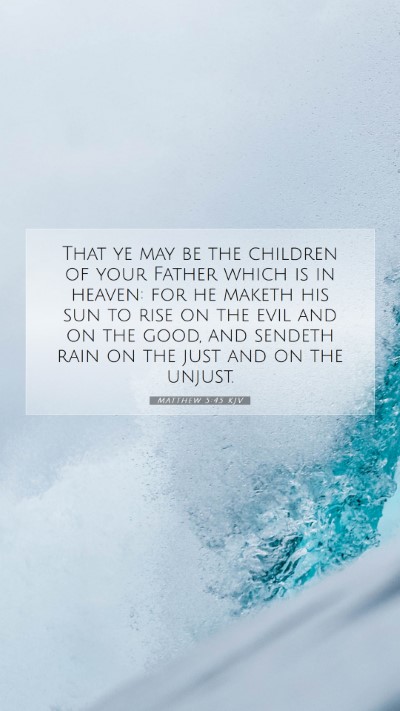Bible Verse Meaning and Interpretation of Matthew 5:45
This analysis provides an in-depth understanding of Matthew 5:45, a verse that has profound implications for our understanding of God’s character and human relationships. The verse states:
"That ye may be the children of your Father which is in heaven: for he maketh his sun to rise on the evil and on the good, and sendeth rain on the just and on the unjust."
Overview of the Verse
In Matthew 5:45, Jesus articulates a key principle of divine love and mercy that transcends human bias and prejudice. This verse is part of the Sermon on the Mount, where Jesus teaches His followers about the Kingdom of God and the nature of true righteousness.
Commentary Insights
-
Matthew Henry Commentary:
Henry emphasizes the inclusivity of God’s love, highlighting that He provides for both the righteous and the wicked alike. This divine benevolence serves to show the nature of God as impartial and generous, which is a reflection of His grace that seekers of justice must emulate.
-
Albert Barnes Commentary:
Barnes stresses the significance of this verse in teaching believers about their relationship to others. The text illustrates that just as God showers His blessings indiscriminately, so should believers practice love and kindness towards all, including enemies. This shows true evidence of being children of God.
-
Adam Clarke Commentary:
Clarke elaborates on the symbolic meaning of light and rain. He points out that the sun symbolizes goodness and truth while rain is portrayed as a necessary element for growth. God's provision in both aspects demonstrates His care for creation, underscoring that His love knows no boundaries.
Theological Implications
This verse holds considerable weight in discussions of Bible verse meanings and interpretations. It challenges the reader to grasp the concept of unconditional love and to show kindness irrespective of others' characteristics or behaviors. Believers are called to reflect God's love in their interactions, encapsulating the essence of Christian teachings.
Application in Daily Life
Understanding this verse has practical implications for life. It invites believers to cultivate a heart of love that mirrors God’s own, pushing them toward altruism and compassion, especially in situations where it may be most challenging.
Key Applications Include:
- Forgiving Enemies: Emulating God's example involves forgiving those who wrong us, treating them with kindness rather than retaliation.
- Acts of Kindness: Performing acts of goodness towards everyone, irrespective of their moral standing, reflects God's grace.
- Promoting Equality: Advocating for justice and equity in social contexts, recognizing all people as recipients of God’s love and mercy.
Cross References
Matthew 5:45 relates to several other scriptural passages that reinforce its themes:
- Luke 6:35 - "But love your enemies, and do good, and lend, hoping for nothing again..."
- James 1:17 - "Every good gift and every perfect gift is from above..."
- Acts 14:17 - "Nevertheless, he left not himself without witness..."
Conclusion
In summary, Matthew 5:45 navigates through crucial aspects of Bible verse understanding and Bible study insights, conveying the divine expectation for believers to manifest God's character through acts of love and mercy. Embracing this teaching requires a personal commitment to embodying the principles of justice and kindness in everyday interactions.
Encouragement for Further Study
For those seeking a deeper dive into Scriptures, consider joining bible study groups or utilizing bible study resources that focus on the practical application of Biblical scriptures. Engaging in online Bible study can also enrich one's understanding of how to interpret Bible verses like Matthew 5:45, aiding in the pursuit of spiritual growth.


